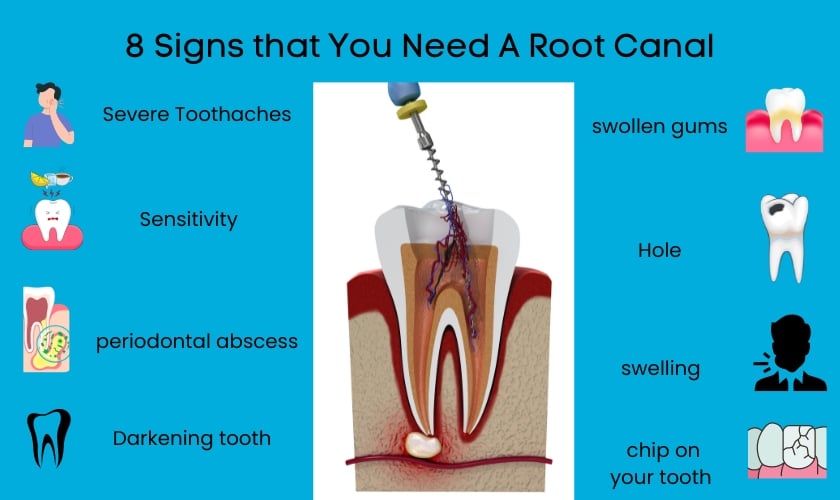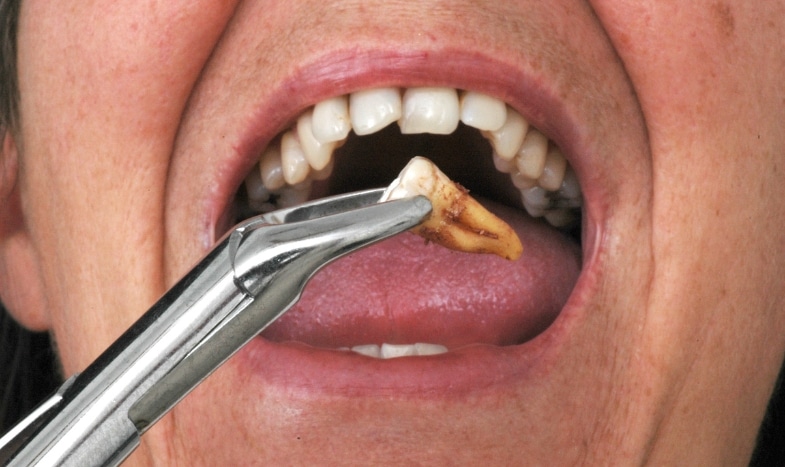
8 Signs that You Need a Root Canal
Imagine this: You’re enjoying a delicious meal when BAM! A searing pain explodes in your tooth, sending shivers down your spine and turning your smile into a grimace. The culprit? It could be a brewing dental storm called a root canal infection. But how do you know if that throbbing toothache is a sign of needing a root canal rodeo or just a passing dental blues? Don’t worry, partner, this article is your roadmap to deciphering the root (canal) of the problem.
The Details of Root Canals:
Before we dive into the signs of needing a root canal, let’s break down the root canal itself. This dental procedure tackles infected pulp, the soft tissue at the tooth’s core. When bacteria infiltrate this pulp, it becomes inflamed and painful, leading to the dreaded root canal infection. The good news? A root canal can remove the infected tissue, preserving the tooth and restoring your smile’s harmony. But how do you know when it’s time to consider this procedure?
Signs of Needing a Root Canal
1. Severe Toothaches: Let’s face it, occasional toothaches happen. But if you’re experiencing a deep, throbbing pain that lingers for days, intensifies with chewing or hot or cold, or even wakes you up at night, it’s a red flag waving frantically. This persistent pain often indicates an inflamed or infected pulp, the innermost layer of your tooth, which a root canal can address.
2. Say No to Sensitivity Salsa: Does every sip of ice cream send shivers down your spine, and does hot soup feel like a fiery invasion? If your tooth is hypersensitive to hot, cold, or even sweet and sour, it could be a sign of irritated or damaged pulp. While not always a direct indicator of needing a root canal, it’s definitely worth mentioning to your dentist.
3. The Pimple Problem: Imagine a small, tender bump emerging on your gum, refusing to budge, and possibly oozing pus. This unwelcome guest, known as a periodontal abscess, often signifies an infection at the root of your tooth. While sometimes treatable with antibiotics, it can also signal the need for a root canal, depending on the severity.
4. The Discoloration Debacle: Is your once-pearly white tooth now sporting a grayish or brownish hue? This discoloration often points to damaged or dead pulp within the tooth, potentially due to an old injury, deep cavity, or infection. While not a guaranteed sign of needing a root canal, it warrants a dental check-up to determine the cause and best course of action.
5. The Swollen Saga: If your face starts to resemble a chipmunk who indulged in one too many acorns (thanks, swollen gums!), it could be a sign of an underlying infection, potentially stemming from a root canal-worthy issue. While other factors can cause gum swelling, it’s crucial to seek a professional evaluation to rule out serious problems.
6. The Bumpy Ride: Ever felt a bump or chip on your tooth, and now it seems to be growing or causing discomfort? This could indicate internal damage that has reached the pulp, potentially requiring a root canal to address the issue and prevent further complications.
7. The Drainage Drama: Is your mouth suddenly playing host to an unwelcome puss-filled drainage party near a specific tooth? This unpleasant occurrence often signifies a dental abscess, and depending on the location and severity, it could necessitate a root canal to eliminate the infection.
8. The Loose Tooth Tango: Is your tooth feeling a bit wobbly, like it’s contemplating joining a jig in your mouth? While gum disease can be a culprit, loose teeth can also stem from weakened bone support due to an untreated infection at the root, potentially requiring a root canal to save the tooth.
At Inland Choice Dental, we recognize that dealing with potential root canal issues can be overwhelming. Our experienced dentist is committed to providing personalized and compassionate care, using state-of-the-art technology to accurately diagnose and address your dental concerns. With a focus on patient comfort and effective treatments, we aim to be your partner in achieving optimal oral health. Don’t let the signs go unnoticed; schedule a consultation with us today.
Frequently Asked Questions:
Q. Is a root canal a painful procedure?
Root canal procedures are performed under local anesthesia, ensuring minimal discomfort during the treatment. Advances in dental technology have made the process more efficient and less painful than commonly believed.
Q. How long does it take to recover from a root canal?
The recovery time after a root canal varies from person to person, but most individuals can resume their normal activities shortly after the procedure. Any post-treatment discomfort is typically managed with over-the-counter pain medication.
Q. Can I prevent the need for a root canal?
Maintaining good oral hygiene practices, including regular dental check-ups and cleanings, can significantly reduce the risk of needing a root canal. Addressing dental issues promptly and avoiding excessive sugar intake are also essential preventive measures.
Q. Is a root canal covered by dental insurance?
Many dental insurance plans cover a portion of the cost of a root canal procedure. It’s advisable to check with your insurance provider to understand the specific coverage details.
Q: Is a root canal painful?
Modern dentistry utilizes anesthesia and sedation techniques to minimize discomfort during the procedure. While some mild soreness after the procedure is normal, your dentist can recommend pain management strategies to ensure your comfort.




